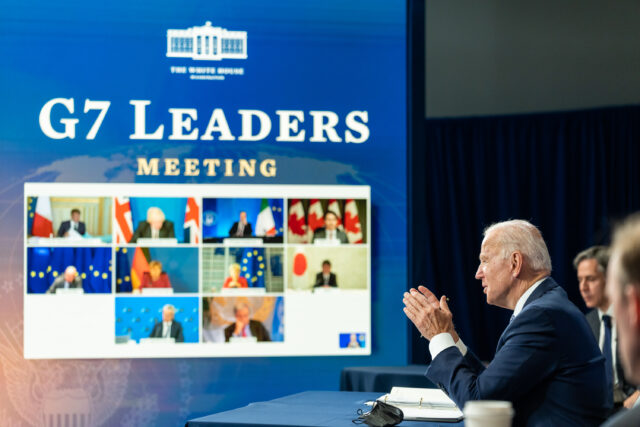NEW DELHI: President Biden has told his NATO allies that there would be no extension of the deadline to withdraw US troops beyond August 31. The message which was conveyed at an emergency virtual session of a meeting with G7 leaders has left Britain, France and Germany reportedly upset for the short timeline in which to evacuate their nationals.
In a press conference post the G7 meeting White House Press Secretary Jen Psaki, confirmed the news. “During a meeting this morning with the G7 leaders, the President conveyed that our mission in Kabul will end based on the achievement of our objectives. That is a key component there. He confirmed we are currently on pace to finish by August 31st.”
Psaki added that the deadline for evacuation was essential because of the increased threat to American troops from the ISIS-Khorasan and that contingency plans could and would be put in place to adjust the timeline. “We have added risk to our troops with increasing threats from ISIS-K, and that completion of the mission by August 31st depends on continued coordination with the Taliban, including continued access for evacuees to the airport.”
The US president’s decision has been reflected in the rather insipid joint statement issued by the G7 leaders post the meeting. While the statement insists that the Taliban would be “held accountable for their actions on preventing terrorism, on human rights in particular those of women, girls and minorities and on pursuing an inclusive political settlement in Afghanistan”, it is difficult how this would be achieved post the actual US withdrawal.
It’s a point Germany’s Chancellor Angela Merkel underscored at a press conference post the G7 meeting where she said, “I want to stress again that the US has the leadership here. Without the US we cannot continue the evacuation mission.”
Merkel’s statement sums up the European realities. German troops had left Afghanistan in July and the German Chancellor reportedly said that there are 10,000 people who are Germany’s responsibility. These include German citizens as well as Afghans who helped German forces.
Protests are also mounting outside the German Parliament by Afghans settled there but at the same time there are huge problems. Germany has already taken on half a million Afghan refugees over the last few years. Add Syrian refugees to this and there will be an immigration backlash in September’s election when Merkel steps down.
Prime Minister Boris Johnson is also in trouble. British media and politicians both within the government and Opposition are furious that the PM went holidaying when Kabul seemed ready to fall. Questioning of the US-UK “special relationship” is also underway as the British PM was reportedly left in the dark about Biden’s August 31 deadline.
Britain has evacuated some 7,000 people from the country, 4,226 of whom were Afghans, the UK Ministry of Defence has said. But British politicians have admitted there will be those who they cannot get out in time. As Armed Forces Minister James Heappey acknowledged “that there is a hard reality that we won’t be able to get out everybody that we want to.”
The UK has a multitude of problems to deal with even with the people evacuated. There is a threat of potential radicals entering the UK. Heappey acknowledges that there are possible on the “no fly list” currently applying for refugee status. The government is worried about the strengthening and resurgence of possible Al-Qaeda networks within the country.
Baroness Eliza Manningham-Buller, former director-general of MI5, the UK’s domestic intelligence service, who spoke in the House of Lords warned that the Taliban’s success would “inspire and embolden jihadis across the world.” Naming Pakistan she said. “The border with Pakistan is porous and its government supportive of the Taliban…There is plenty of room to recruit, plot and train a new generation of terrorists. I expect more terrorism directed against the West.”
Traveller, bibliophile and wordsmith with a yen for international relations. A journalist and budding author of short fiction, life is a daily struggle to uncover the latest breaking story while attempting to be Hemingway in the self-same time. Focussed especially on Europe and West Asia, discussing Brexit, the Iran crisis and all matters related is a passion that endures to this day. Believes firmly that life without the written word is a life best not lived. That’s me, Ashwin Ahmad.





